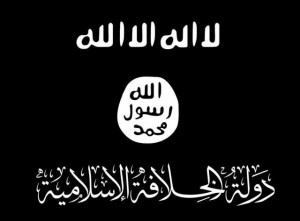By Necla Acik
Necla Acik is visiting Research Fellow at the Regent’s Center for Transnational Studies in London and has co-authored with Umut Erel (Open University) the report “The Struggle for Freedom and Gender Equality: The Contemporary Kurdish Women’s Movement in North Kurdistan/Turkey and the Diaspora” for London based women rights and advocacy group Roj Women. Her expertise is in gender and nationalism in Kurdistan.
![Flag of the YPG. By LibComInt (Own work) [CC-BY-SA-4.0], via Wikimedia Commons](http://occupyworldwrites.org/wp-content/uploads/2014/10/YPJ_Womens_Defence_Units.jpg)
Flag of the YPG. By LibComInt (Own work) [CC-BY-SA-4.0], via Wikimedia Commons
For several days tens of thousands of
Yezidis got trapped on Mount Sinjar in early August 2014 in an attempt to flee the attacks of the Islamic State (IS) on their towns and villages in Sinjar region in north-west Iraq, close to the Syrian border.
It soon turned out that these attacks were not just a strategic move by IS to provide them with a free gateway to northern Syria, but horrific tales of execution, abduction of women and children, forced conversions to Islam, and the mass exodus suggests a more sinister plan.
Amnesty International documented the atrocities of IS and accused them of carrying out ethnic cleansing on a historic scale, systematically targeting non-Arab and non-Sunni Muslim local communities, such as the Yezidi Kurds, Assyrian Christians, Turkmen Shi’a, Shabak Shi’a, Kakai and Sabean Mandaeans.
Several months before the IS attack, Yezidi leaders feared that they would be targeted by IS and tried to lobby for protection and intervention with trips to Baghdad and to the Kurdish capital Erbil. The Iraqi Army had already deserted the region, but they were reassured by the Kurdistan Regional Government (KRG) that their Peshmerga Armed Forces were prepared for an onslaught by IS and were ready to defend their Kurdish co-patriots.
Yet, as IS started to advance and attack village by village, to the surprise of everyone, the Peshmergas quickly withdrew, leaving the civilian population widely unprotected. Left behind were poorly equipped local militia and a few Peshmerga fighters who, at their own risk, stayed behind. They managed to hold back IS for a few days, enabling civilians to flee to the Sinjar mountains, but they had little power to prevent what Yezidis call the 73rd massacre on their community. This included group executions, abduction of women as spoils of war, rape and the trafficking of women and girls as sex slaves.
Kurdish female fighters rescue the trapped Yezidis from IS
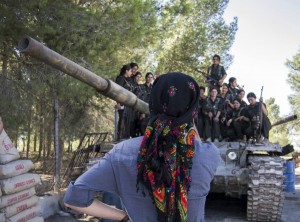
via Facebook
As news of this humanitarian disaster went around the world and the international community was debating about a possible intervention, help came from somewhere else. The Kurdish women fighters (Women’s Protection Unit, YPJ) of Rojava (the self-proclaimed Kurdish autonomy region in northern Syria) and the women’s guerrilla units (YJA-Star) of the Kurdistan Workers Party (PKK) along with their male comrades were the first forces to respond to the calls of the trapped Yezidi refugees. Setting off from Rojava, these fighters cleared more than a 100km passage through northern Iraq to Mount Sinjar and broke the siege of IS. They provided the desperate refugees with a secure corridor, which enabled them to embark on a 24 hour march into the relatively safe northern part of Syria/Rojava, where they received immediate medical attention, food and shelter.
The PKK guerrillas and the fighters from Rojava were the only force on the ground to respond immediately to the crisis preventing further IS massacres in early August. It was also striking that whole women’s units were among them, not just individual female fighters. Especially, as female fighters arouse so much attention. IS fighters were said to be dreading that the door to paradise would be shut to them if they had been killed by a woman.
While such tales have certainly increased the popularity of Kurdish female fighters in the international media – this was even featured in the free paper Metro – the reality is that these women and men who dared to stand up against IS put themselves in a very vulnerable position; they became the primary target of IS. Although they have been the strongest to fight back against IS, only the Peshmergas have been supplied with weapons and included in the US coalition to combat IS.
The PKK and Rojava administration were neither consulted about co-ordinated actions against IS, nor were they supplied with weapons to defend themselves and the population against further IS attacks. As the founder of Medecins Sans Frontieres Dr Jacques Bérès has stated, the Kurdish women fighting IS have nothing but their “courage and Kalashnikovs”. Even two months after the IS massacre on Mount Sinjar, it is again the women’s defence force of the PKK who are protecting the civilian population from ongoing IS attacks. They have also vowed to find the thousands of abducted Yezidi girls and women. Swedish politicians joining this campaign have urged the United Nations to investigate and identify the young women who may have been trafficked to other countries.
The ‘Rojava Revolution’ and the Kurds in North Syria
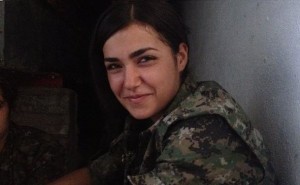
via Facebook
Amid the civil war in Syria and the withdrawal of the Syrian Army in the north of Syria in 2012, the population of Rojava took control of their region and declared a democratic multi-ethnic and multi-religious autonomy similar to the Swiss model with three separate and geographically detached administrative regions or cantons (Kobane, Afrin and Cizire).
Despite economic hardship and a de facto embargo from trade with other parts of Syria, Turkey and KRG, the people of Rojava have been using their newly acquired freedom to experiment with radical democracy. They are applying the Democratic Autonomy project propagated by the imprisoned leader of the PKK, Abdullah Öcalan, which is also being embarked upon by the Kurdish movement in North Kurdistan/ Turkey.
Within two years Rojava has witnessed substantial institutional and political changes and for the first time in Syrian history, the communities are governing themselves without the intervention of an authoritarian central government. Referring to these developments as the ‘Rojava Revolution’, the people of Rojava have eagerly been involved in organising their own affairs, from running schools and hospitals to generating electricity and even making their own tanks.
The most visible change has perhaps been the inclusion of women in the defence force and the police as separate units through the establishment of the Women’s Protection Units (YPJ) and the Women’s Security Forces (HAJ). According to various estimates, female fighters make up between 7,000 and 10,000 of the Kurdish forces fighting in Syria, representing roughly one third of the People’s Protection Unit (YPG) in Rojava, the military force that has been set up to defend Rojava.
The empowerment of women has been a key to the Rojava revolution, which explains its popularity particularly among women. A recent report on Rojava commissioned by the London based women’s rights and advocacy group Roj Women, shows that since the self-declared autonomy, Kurdish women have established a dozen women’s unions, associations and committees and have carried out gender awareness campaigns on a large scale in all three cantons.
Among the new regulations instigated to combat gender discrimination are a ban on polygamy for men and underage marriage. Also, unusual for the region, cases of domestic violence are being taken more seriously by being referred directly to the police and courts, while women and their children are provided with temporary safe accommodation. To ensure that women are represented in public offices and in civic life, positive discrimination measures, similar to those practiced within the Kurdish movement in Turkey, are introduced. These include the co-chair system where key decision-making positions are shared by men and women, and the establishment of various women-only bodies making sure that women’s voices and interests are no longer ignored.
Rojava’s model of gender equality borrowed from the Kurdish movement in Turkey and the PKK

Kurdish YPJ forces. Image via Twitter.
Rojava’s model of empowering women is based upon the gender liberation perspective developed by the PKK and applied by the Kurdish movement and the pro-Kurdish Peace and Democracy Party (BDP) in Turkey, which runs the local governments in a number of Kurdish provinces in the South-East of Turkey or Northern Kurdistan.
A strength of the PKK and the Kurdish movement in North Kurdistan has been their criticism of Kurdish society in terms of class and gender inequalities. Women’s participation in the armed struggle and their success as political activists has broken many taboos in Kurdistan as national movements very often do, but it has not stopped there.
While in the 1990s women were mobilised into the Kurdish national movement primarily to support and legitimise the national cause, with the new political shift towards Democratic Autonomy, stronger emphasis has been put on everyday politics and of provoking change from below and within the society rather than waiting for the ‘big revolution’ to happen. The Kurdish movement and the PKK put so much emphasis on women’s liberation, that women’s demands for more power and recognition within the movement could not easily be ignored.
In addition to this, very much to the dismay of many feminists however, the women trusted Abdullah Öcalan, the leader of the PKK, in guiding them towards gender liberation. Despite his imprisonment since 1999, it was women who supported him most during the turbulent years following his arrest and the declaration of his new political, and at that time controversial, line. In return Öcalan became more radical in his promotion of gender liberation and urged women within the party to question male dominance within their own ranks.
Thus, the ideological support provided by the PKK and its leader Abdullah Öcalan has helped women within the Kurdish movement in North Kurdistan/Turkey to question and challenge women’s oppression and gender inequalities and many women began to develop a feminist consciousness. They strengthened their position within the legal Kurdish movement and built autonomous and semi-autonomous organisations including women’s assemblies within the pro-Kurdish political parties, women’s centres and associations, a press agency, women’s cooperatives, women’s academies and so on.
Within the guerrilla movement, women also organised as separate and independent units by setting up their own party, the Kurdistan Woman’s Liberation Party (PAJK) and their own guerrilla force (YJA-Star).
Today, women constitute a strong force within the pro-Kurdish parties in Turkey. They have been working initially on low level grass-roots mobilization but have also demanded more recognition for their political work. This has led to the introduction of positive discrimination policies and includes the implementation of a 40 per cent quota of women by the pro-Kurdish parties in Turkey. It ensured that women were elected into local and national governments as councillors, mayors and as members of parliament.
For example in the 2007 national election the pro-Kurdish parties won 21 seats, with a female representation of 38 per cent. This was a significant achievement as the overall female representation in the parliament of the ruling Justice and Development Party (AKP) and the main opposition, the Republican’s Peoples Party (CHP) was only 9 per cent. In the latest local elections in March 2014 in Turkey, only 37 women were elected as mayors (out of a total 1,364), of which over half were women from the pro-Kurdish parties who have applied the women’s quota rigorously. Besides the quota, the pro-Kurdish parties have been applying a pioneering power sharing system since 2009 that allows key decision-making positions within the party to be shared by both men and women. This means that all elected mayors and councillors have a co-chair who share their salary as well as duties and have equal rights of representing their constituency.
This system has been expanded to other civil society organisations embedded within the Kurdish movement. These and other positive discrimination policies have been highly effective in bringing women’s issues to the agenda of Kurdish politics and raising the profile of women in politics more generally. Arguably, Kurdish women’s representation in political positions and parties has become a yardstick for democratization that has challenged other parties in Turkey to follow suit.
Rojava benefited from the political expertise of the PKK and the Kurdish movement in North Kurdistan/Turkey in setting up a self-governing system and in pursuing gender equality initiatives. The Rojava revolution might seem very ambitious, given that no regional or international power has any interest in supporting and maintaining them. Yet, it was their idealism and their belief that diversity in the Middle East is an asset rather than a problem that led them to take responsibility and to go to Mount Sinjar to rescue the besieged civilian population. Their vision of self-rule and their success in building political capacity has enabled Rojava to become a relatively stable and secure region, offering tens of thousands of refugees from Syria and Iraq, a shelter. This however changed with Rojava becoming the focus of intense IS attacks.
The siege of Kobane
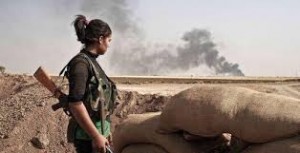
Kurdish YPJ fighter overlooks battlefield. Image via Twitter.
Rojava is now paying the price for taking on IS and for exercising popular self-governance. Despite ongoing US air-strikes on IS strongholds for over three weeks, the Kobane canton of Rojava has been under heavy attack by IS since September 15. The geographical position of Kobane makes it difficult for any outside help from the other cantons and the PKK guerrillas to get through. Its border to the north with Turkey is heavily guarded. The rest of Kobane is encircled by IS. The surrendering of Kobane is most likely to set off another massacre similar to that on Mount Sinjar. Most of the estimated 160,000 inhabitants of Kobane have already fled the area, but for those thousands of residents who have remained in Kobane attempting to defend themselves against IS, the future looks very grim.
An unclassified US memo written by the former US Ambassador to Syria Robert Ford, suggests that Turkey is pushing for a Sunni-Islamic state in Syria, regardless of the demands of much of the opposition for a secular and multi-ethnic federation as suggested by many Syrians and particularly the minorities such as the Christians, Alawites, Druze and Kurds.
Moreover, in the same memo, Turkish officials are reported to have suggested that a future Syrian constitution should be “Without mention of the Kurds and that any Kurdish problems should be resolved through local municipalities”. It is exactly this mentality of denial and the subsequent assimilation policies of the Turkish state – and similarly that of Iraq, Syria and Iran – that led to the uprisings of the Kurds in the region, causing the loss of over 40,000 lives in the conflict in Turkey alone.
Thus, despite being besieged by IS in Kobane, the Kurds in Rojava deeply mistrust any Turkish military intervention, not least because they accuse Turkey of actively supporting IS by allowing them to cross the border back and forth. For Turkey, struggling with concessions for their own Kurdish population, an autonomous Rojava run by Kurds affiliated to the PKK is an absolute no. A Turkish intervention in Rojava would not only threaten the autonomy of Rojava, which represents a model for the PKK in Turkey, but would also threaten the peace process with its own Kurds in Turkey.
Democracy in action in the Middle East
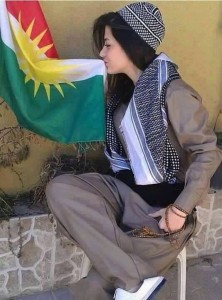
via Facebook
The autonomous region of Rojava and its unique population is illustration enough of what we have long understood from Afghanistan, Iraq and other conflicts around the world; that democracy has to come from within. No military intervention from the west or from a third power can teach a country and its citizens how to reconcile differences and build a future together.
Yet, Rojava is being punished for trying to stand on its own feet and for their alliance with the PKK which has helped them ideologically and logistically to set up their own administration as well as with their fight against al-Qaida affiliated groups.
Although the PKK is listed as a terrorist organisation, and has indeed been engaged in violent conflict and has been ruthless at times towards internal opposition, their policies and strategies have changed over the years. Their popularity among the Kurds remains high as they have been leading the struggle for civil liberties, political representation and recognition of cultural rights for the last 30 years or more.
The Democratic Autonomy project has been one of the key political projects of the PKK devised as a long term solution for the Kurdish question in the Middle East. Proposed as an alternative to a separate Kurdish nation state, it focuses on widening democratic forms of participation and developing alternative forms of governance and economy. This moderate political line of the PKK, compared to the 1980s and 1990s, has allowed the Kurdish movement in Turkey to strengthen its legal political struggle and aims to open up negotiations for a peaceful political solution.
A secular, multi-religious and multi-ethnic Rojava with democratic ambitions constitutes a threat for IS and equally for the conservative Islamic government in Turkey. For the west however, which complains about the lack of democracy in the Middle East, what makes them hesitate to support such a progressive movement, one wonders?
This movement has not only been halting the advance of IS but has also providing security and stability in the areas run by them, it has empowered women and built an inclusive form of governance, involving many of the region’s diverse populations such as the Kurds, Arabs, Assyrians, and Armenians.
This article appeared in OpenDemocracy.net on October 22, 2014, and is republished here under a Creative Commons Attribution-NonCommercial 3.0 licence.


![Bhopal Memorial. Photo Luca Frediani uploaded by Simone.lippi [CC BY-SA 2.0] from Wikimedia Commons](http://occupyworldwrites.org/wp-content/uploads/2015/01/640px-Bhopal-Union_Carbide_1-300x200.jpg)
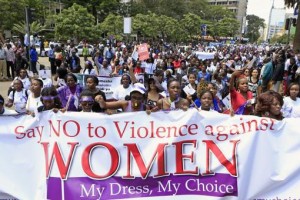
![Flag of the YPG. By LibComInt (Own work) [CC-BY-SA-4.0], via Wikimedia Commons](http://occupyworldwrites.org/wp-content/uploads/2014/10/YPJ_Womens_Defence_Units.jpg)





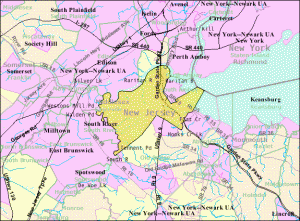
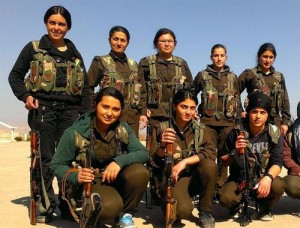
![Imagine "upskirting" photos being taken here. Mrs. Laura Bush, first row-center, joins former President Jimmy Carter and his wife, Rosalynn Carter; former President Bill Clinton, and his wife, Hillary Clinton; Mrs. Nancy Reagan; Caroline Kennedy Schlossberg, her husband Edwin Schlossberg; Mrs. Barbara Bush; Susan Ford Bales, daughter of former President Gerald R. Ford; and Patricia "Tricia" Nixon Cox and her husband, Edward Cox, upper-right, at the funeral service for former first lady Lady Bird Johnson. Photo By Shealah Craighead, White House Photo Office [Public domain], via Wikimedia Commons](http://occupyworldwrites.org/wp-content/uploads/2014/09/Funeral_service_for_Lady_Bird_Johnson-300x207.jpg)
